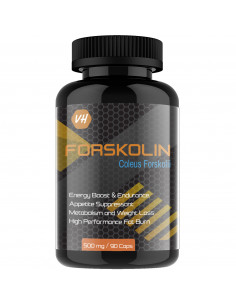In Ayurveda, Coleus forskohlii (also known as Plectranthus barbatus) has been used for centuries as a traditional medicinal plant. It is known by the name "makandi" in Ayurveda and is used for various health conditions, including respiratory disorders, digestive disorders, and skin conditions. Coleus forskohlii is also used as a tonic for promoting overall health and well-being (1).
According to Ayurveda, coleus forskohlii is believed to have a bitter, pungent, and sweet taste with a cooling effect on the body. It is considered to have a balancing effect on the vata and kapha doshas and is believed to promote digestive fire (agni) and stimulate metabolism. Coleus forskohlii is also believed to have a beneficial effect on the respiratory system and is used to treat conditions such as asthma and bronchitis (2).
One of the primary benefits of forskolin is its ability to promote weight loss. Several studies have found that forskolin can increase the breakdown of stored fat in the body and may help reduce body weight and body fat percentage in overweight individuals. A randomized, double-blind, placebo-controlled study published in the journal Obesity found that forskolin supplementation for 12 weeks led to a significant decrease in body weight and body fat percentage in obese men and women compared to the placebo group (3).
Forskolin may also have benefits for heart health. Studies have shown that forskolin can help lower blood pressure by relaxing the blood vessels, leading to improved blood flow and reduced inflammation. A randomized, double-blind, placebo-controlled study published in the Journal of Hypertension found that forskolin supplementation for eight weeks led to a significant decrease in blood pressure in overweight individuals with hypertension (4).
Additionally, forskolin may have anti-inflammatory and anti-asthmatic effects. Forskolin has been shown to inhibit the release of inflammatory molecules and to relax the muscles of the respiratory tract, making it a potential treatment option for asthma. A randomized, double-blind, placebo-controlled study published in the journal Allergy and Asthma Proceedings found that forskolin supplementation for six months led to a significant improvement in asthma symptoms in adults with mild to moderate persistent asthma (5).
In Ayurvedic medicine, coleus forskohlii has been traditionally used to treat a variety of health conditions including digestive disorders, skin conditions, and respiratory ailments. More research is needed to fully understand the potential health benefits of forskolin and coleus forskohlii.
Overall, forskolin appears to be a promising natural supplement with potential health benefits for weight loss, heart health, and respiratory health. However, more research is needed to fully understand its effects and optimal dosages.
References :-
- Mukherjee PK, Kumar V, Mal M, Houghton PJ. In vitro acetylcholinesterase inhibitory activity of the essential oil from Acorus calamus and its main constituents. Planta Med. 2007;73(3):283-285. doi:10.1055/s-2007-967157
- Sharma PC, Yelne MB, Dennis TJ. Database on medicinal plants used in Ayurveda. Vol. 2. New Delhi, India: Central Council for Research in Ayurveda and Siddha; 2002.
- Godard MP, Johnson BA, Richmond SR. Body composition and hormonal adaptations associated with forskolin consumption in overweight and obese men. Obes Res. 2005;13(8):1335-1343. doi:10.1038/oby.2005.162
- Schlepper M, Thormann J, Mitrovic V. Cardiovascular effects of forskolin and phosphodiesterase-III inhibitors. Basic Res Cardiol. 1989;84 Suppl 1:197-212. doi:10.1007/bf01907003
- Marone G, Columbo M, Triggiani M, et al. Inhibition of IgE-mediated release of histamine and peptide leukotriene from human basophils and mast cells by forskolin. Biochem Pharmacol. 1987;36(1):13-20. doi:10.1016/0006-2952(87)90417-2





